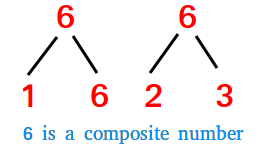Become math lovers!
What is a composite number ? Definition and examples
A composite number is a counting number or whole number with more than 2 factors.

For example, 4 has 3 factors and these factors are 1, 2, and 4.
6 has 4 factors and these factors are 1, 2, 3, and 6.
9 has 3 factors and these factors are 1, 3, and 9.
Therefore, 4, 6, and 9 are composite numbers since they each have more than 2 factors.
A composite number is also called composite.
Any composite number can be expressed as the product of two smaller numbers in at least two different ways.
As you can we were able to write 6 as the product of two smaller numbers in two ways. That is the reason why 6 is a composite.